October 25, 2025 | 02:09 GMT +7
October 25, 2025 | 02:09 GMT +7
Hotline: 0913.378.918
October 25, 2025 | 02:09 GMT +7
Hotline: 0913.378.918
When it comes to coconuts, most people immediately think of Ben Tre, which is the country's "coconut capital." Without witnessing firsthand the lush coconut gardens in Tay Ninh, few would believe that the tree so familiar to Southern Vietnam could grow well and generate high economic value in Tay Ninh, often dubbed the land of sun.
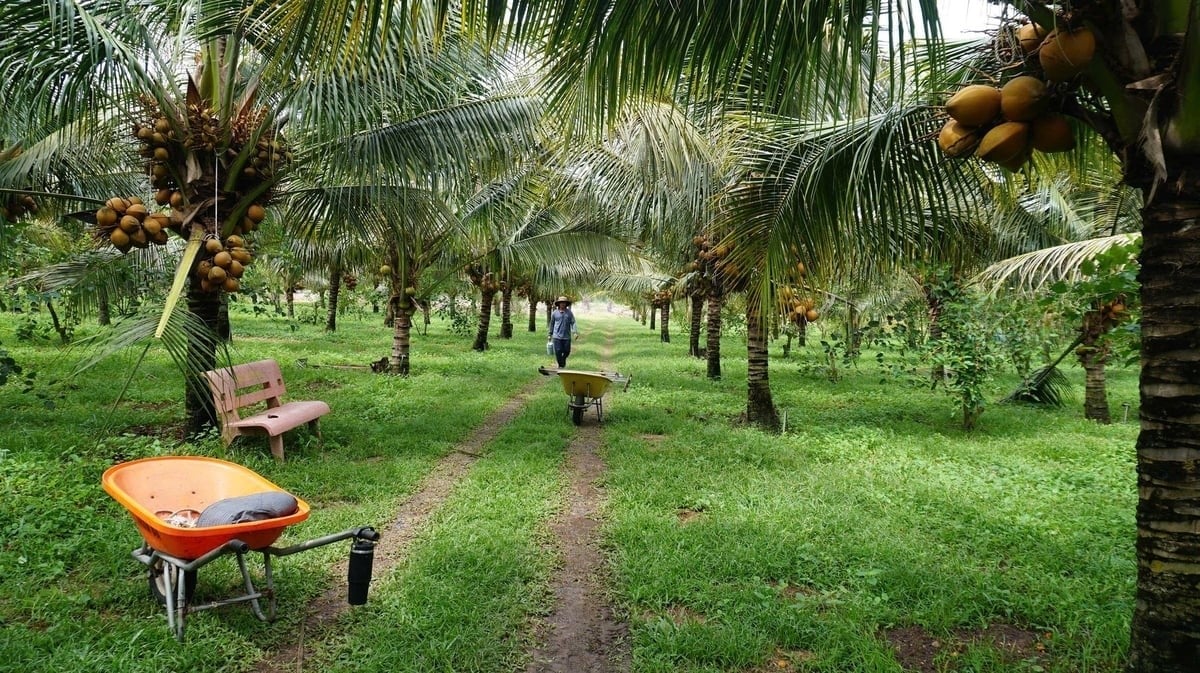
The organic coconut garden of Vietnamese Coconut 78 Agricultural Service Cooperative. Photo: Tran Trung
Mr. Nguyen Van Tien, a farmer in Tan Bien commune (Tay Ninh), is among the pioneers who have successfully developed the organic coconut farming model. Standing amid rows of lush green coconuts on this harsh land of sun and wind, he said, "Born and raised in the coconut land of Ben Tre, in 2008, after settling down with his family in Tay Ninh, he brought about a dozen Siamese coconut seedlings from his hometown to plant experimentally. At that time, rubber was still fetching good prices, so he only intercropped coconuts. By 2017, when rubber prices plunged, he decided to cut down the rubber trees for mass coconut farming."
"At first, I planted the traditional dwarf coconut variety, but many trees failed to meet quality standards. Learning from experience, I gradually replaced them with new varieties such as Ben Tre Red Siamese, Malaysian Red Siamese, and Green Siamese. These varieties have a short establishment period, only 2-3 years before fruiting, with high yields and sweet water. They are favored in the market, which helps maintain stable and high selling prices. Particularly, Siamese coconuts can be harvested all year round; planting once allows exploitation for up to 30 years. The trees are short, only about 3-4 meters tall, making harvesting easier and care more convenient," Mr. Tien shared.
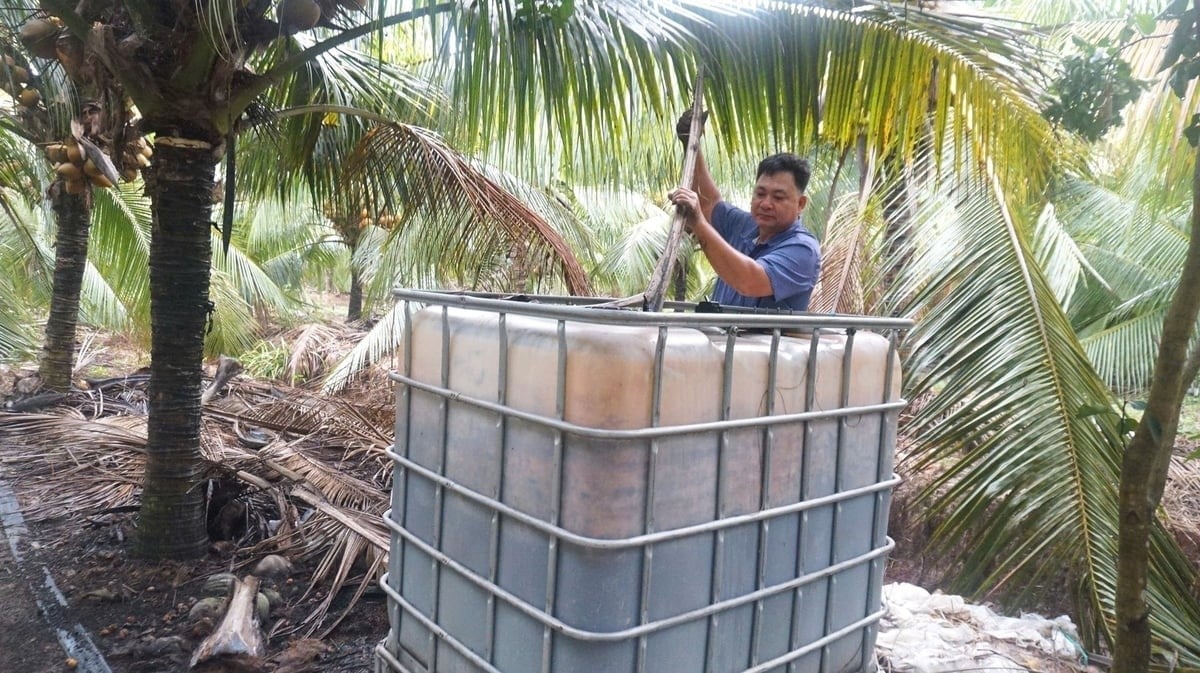
Vietnamese Coconut 78 Agricultural Service Cooperative makes use of locally available by-products to produce high-quality organic fertilizer. Photo: Tran Trung.
Mr. Tien added that Tay Ninh has an extensive irrigation canal system that ensures a stable water supply. The locality also has abundant livestock manure and agricultural by-products such as sugarcane, cassava, and pineapple. Taking advantage of these resources, he combines coconut husks with probiotics to produce high-quality organic fertilizer as an alternative to chemical fertilizers, helping improve soil while lowering input costs.
In terms of pest prevention, he raises parasitic bees under the coconut canopy to naturally control pests. This practice significantly reduces the use of pesticides, keeps the plantation environment green, clean, and safe, and helps maintain a balanced ecosystem, thereby enabling coconut trees to grow sustainably and bear fruit more consistently. He absolutely avoids the use of herbicides, growth stimulants, or other harmful chemicals in cultivation.
Compared to Ben Tre, Tay Ninh has lower soil salinity. To ensure the sweetness of coconut water remains equivalent, he supplements the soil with salt during cultivation to balance the mineral content. Thanks to this method, his coconuts not only achieve high yields but also maintain stable quality that is accepted in the market.
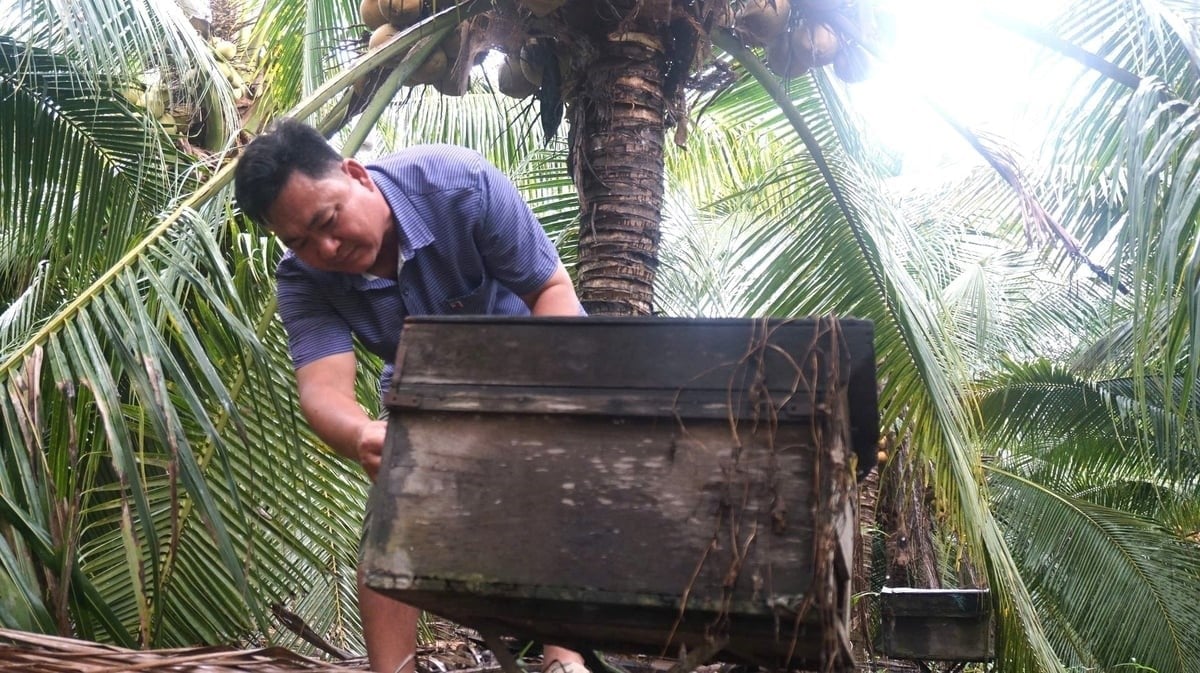
The Vietnamese Coconut 78 Agricultural Service Cooperative raises honeybees to pollinate coconut trees and prevent harmful pests. Photo: Tran Trung.
According to Mr. Tien, the market now offers a wide range of fungi and probiotics, creating favorable conditions for farmers to self-produce organic fertilizer right at home.
"Just try organic fertilizer for about six months, and the efficiency will be clear. Chemical fertilizers may boost rapid growth, but their effects are short-lived, leaving trees weakened, with yellowing leaves and sparse fruiting seasons. Using urea or NPK might make coconut trees flourish quickly, but when frost strikes, the fruit often drops in large numbers. In contrast, organic fertilizer helps trees grow more durably, with higher and more stable yields in the long run. Coconuts grown with organic fertilizer have softer husks, which are easier to peel than those from trees treated with chemical fertilizers," Mr. Tien explained.
Beyond effective farming practices, in an effort to overcome the situation of small-scale, fragmented production and gradually enhance product value, in April 2019, Mr. Tien gathered members to establish the Vietnamese Coconut 78 Agricultural Service Cooperative. According to him, the cooperative was not founded merely to "chase after" new rural criteria but to pursue a sustainable production–business model.
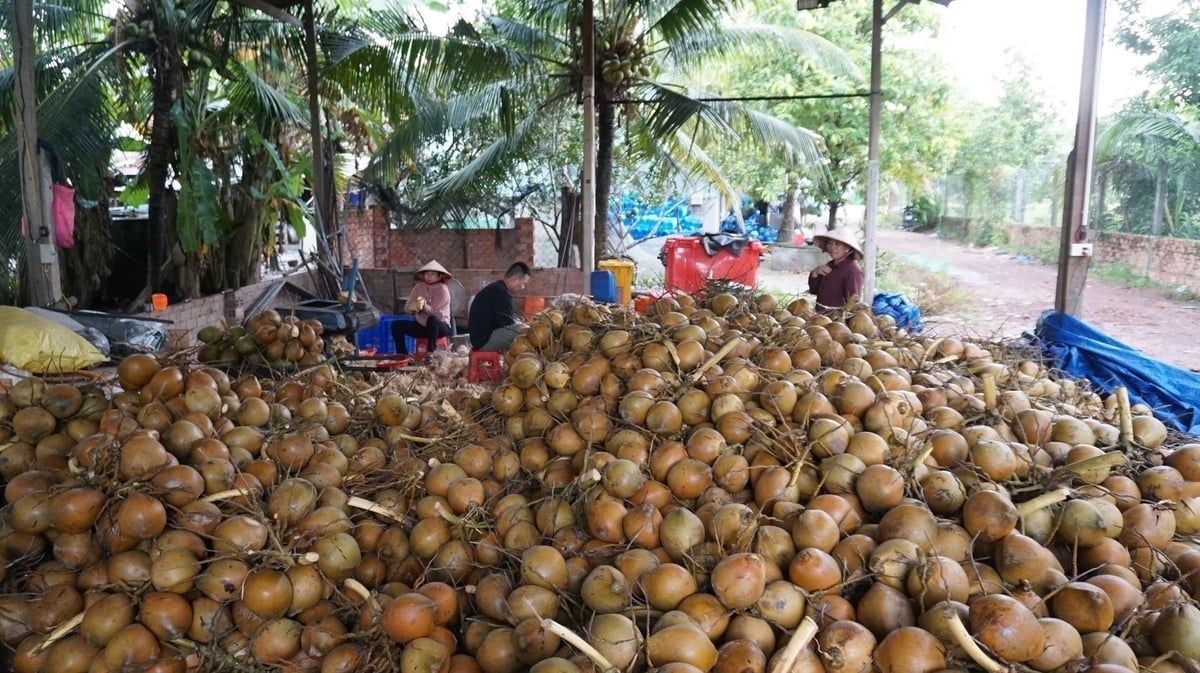
Vietnamese Coconut 78 Agricultural Service Cooperative guarantees product purchases for local coconut growers. Photo: Tran Trung.
In addition to Mr. Tien's 15 hectares of coconut, his cooperative has linked with many local households, expanding the total coconut area to nearly 300 hectares. Farmers in the region often own large areas (1–10 hectares/household), so the linkage helps consolidate output to meet large orders. The cooperative accesses farmers through direct purchasing and signing consumption contracts, while also providing technical support, supplying materials, and guiding production in an organic and safe direction. Seeing clear efficiency, local farmers have voluntarily introduced and encouraged new households to join.
"Even during difficult market conditions, when coconut prices in the Southwest dropped sharply, the cooperative still maintained stable purchasing prices, accepting lower profits or even breaking even to sustain linkage. There were times when traders refused to buy Green Siamese coconuts, but the cooperative continued purchasing to reassure farmers," Mr. Tien shared.
Mr. Nguyen Van Phuc, one of the cooperative’s first members, recalled, "Before joining, I and many other coconut farmers were hesitant, even opposed, believing that without chemical fertilizers, coconuts would struggle to grow, or fearing that signing contracts would leave us vulnerable to price squeezing by enterprises. But after working with the cooperative, we realized that besides guaranteed consumption, the cooperative also supplies high-quality organic fertilizer purchased directly from factories at preferential prices under collective contracts, which are much cheaper than buying through agents."
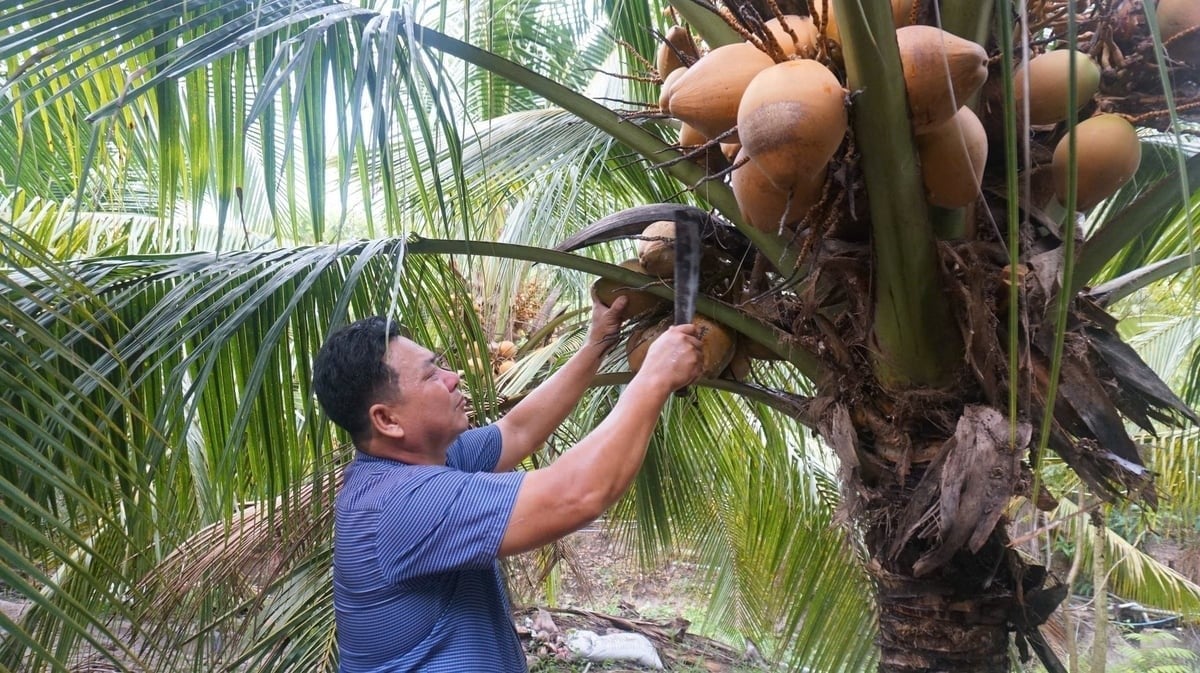
Members of the Vietnamese Coconut 78 Agricultural Service Cooperative feel secure in production thanks to technical support and product consumption guarantees. Photo: Tran Trung.
The cooperative has now linked with an enterprise in Ben Tre to inspect and certify its coconut-growing areas to organic standards, paving the way for fresh coconuts to be purchased at prices 5% higher than the market rate for export to China.
From just a few coconut seedlings he brought from Ben Tre to plant experimentally, Mr. Nguyen Van Tien has transformed the sunny and windy land of Tay Ninh into lush organic coconut gardens that challenge all prejudices. Not stopping at his own success, he has mobilized many local households to join the linkage, establishing the cooperative and moving toward large-scale, professional, and sustainable production.
The story of organic coconuts in Tay Ninh demonstrates that by leveraging inherent local advantages, combining science with experience, and maintaining the 'heart' in production, even harsh lands can rise to high-value agricultural models. This is not only a new direction for coconuts but also opens up opportunities for clean and sustainable agricultural development in Tay Ninh in the future.
Translated by Thu Huyen

(VAN) Developing low-emission cultivation technology packages, MRV system, strengthening multi-stakeholder cooperation are to realize the goal of low-emission crop production.
/2025/10/23/5928-2-194850_964.jpg)
(VAN) The 'Regenerative cocoa production to support livelihood development in Vietnam' (ReCoPro) project marks an important step toward sustainable cocoa production.

(VAN) Reducing antibiotic dependence in livestock production helps protect public health, enhance food safety, and promote sustainable agricultural development.

(VAN) Experts describe Viet Nam as a 'policy laboratory' within ASEAN, where new agroecological, green finance, and risk-management initiatives are being piloted before wider regional adoption.

(VAN) Limiting rice straw burning and reusing agricultural by-products as materials or fertilizers not only improves soil health but also helps clean the air.

(VAN) ASSET delivers long-term vision and strategy, innovative models, learning networks, policy impact, and measurable environmental benefits.
/2025/10/21/1634-2-111000_41.jpg)
(VAN) A working delegation led by Vice Chairman of the Ho Chi Minh City People's Committee Bui Minh Thanh inspected fishing ports and assessed fishing vessel management work ahead of the EC inspection.